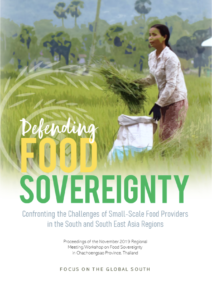27/09/2020
Under: Asia/World, Food Sovereignty and Agroecology, Reports
While food sovereignty has long been practised at the grassroots level, the concept has not won the popular support needed to significantly influence government policies and programs as a step towards more meaningful systemic change and transformation. One obvious reason is that capitalist interests and landed elites continue to have control over legislative functions of states. Meanwhile, on the part of social movements, policies and socioeconomic structures needed to mainstream food sovereignty have not been fleshed out sufficiently. At the same time, the socioeconomic realities faced by stakeholders create difficulties in narrowing gaps in knowledge, practice, and movement building needed to generate social pressure for legislative reforms and to effectuate systemic changes.
As part of the initiative of filling in these gaps, the Regional Meeting on Food Sovereignty and Agroecology Exchange aimed to map the challenges confronting small-scale food providers, consolidate their responses to these challenges, and facilitate the exchange of knowledge and experiences on emerging alternative practices. The sharing of knowledge, experiences, and practices was intended to deepen participants’ appreciation of food sovereignty as a paradigm, practice, and movement. At the same time, it was envisaged to serve as a guide for future campaigns on effectively engaging government institutions towards the protection of the right to food, resisting systems and institutions that threaten local food systems, defending the rights and dignities of small-scale food providers, and putting forward viable community-driven alternatives.
The meeting was organized on November 30 to December 3, 2019 at the Agroforestry Learning Center Phuyai Wiboon Khemchalerm in Chachoengsao Province, Thailand. The learning center is located in a 10-rai (1.6 hectares) sustainable agroforestry model farm. The center was established to help build knowledge and awareness on the spirit of Wanakaset一a practice that reflects the principles of community self-reliance and harmonious living with the ecosystems and nature. A total of 59 grassroots participants (25 men and 34 women) from six countries, including Cambodia, India, Indonesia, Laos, Thailand, and the Philippines joined the meeting with the following objectives:
- Discuss the various concepts around food sovereignty–drawing experiences from various local, national, regional, and international campaigns;
- Unpack the political economy of food provision, production, distribution, and consumption–identifying issues, gaps, and constraints in terms policies and programs including the unequal access to food, land, water, and forest resources by grassroots communities;
- Highlight alternative models and practices in food provision and food production from different sectors and campaigners; and
- Build solidarities and identify strategies, common grounds, and convergence spaces to effectively push food sovereignty campaigns forward.
The four-day agenda also touched upon the multi-dimensional approaches to food sovereignty, with a focus on the political and socio-ecological struggles in food provision, production, distribution, and consumption.






